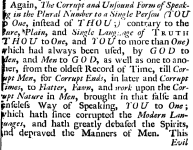AG31
Literotica Guru
- Joined
- Feb 19, 2021
- Posts
- 3,216
I tried to make the language of one of my characters sound like what I heard from simpering villains in movies with medieval settings. One reader didn't get that and thought it just represented no ear for dialogue. If anyone's interested in giving me their take on the sound of the language, or suggestions about how to better achieve my intention, it's this one: An Enigma It's one Lit page, BDSM.
Does anyone have suggestions for a convention for titles for requests for this sort of help?
Does anyone have suggestions for a convention for titles for requests for this sort of help?
